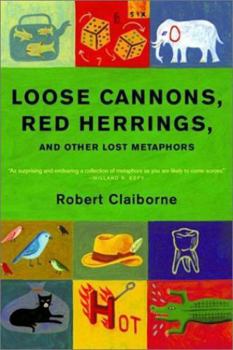Loose Cannons, Red Herrings, and Other Lost Metaphors
Select Format
Select Condition 
Book Overview
The English language is a treasury of splendid mysteries, among them the many words and phrases whose origins we no longer know. Often the original meaning was literal, pertaining to forgotten objects or activities--such as "aftermath," which once meant the grass that sprang up after a farmer had mowed a field. With the informal scholarship and good-humored wit that are his trademarks, Robert Claiborne reveals the wonders buried in our speech, vivid...
Format:Paperback
Language:English
ISBN:039332186X
ISBN13:9780393321869
Release Date:July 2001
Publisher:W. W. Norton & Company
Length:256 Pages
Weight:2.05 lbs.
Dimensions:0.7" x 5.5" x 8.2"
Customer Reviews
2 ratings
A reference for the hidden poetry of our language
Published by Thriftbooks.com User , 18 years ago
A metaphor is "A word or phrase used figuratively." That's fine for expressions such as "dyed in the wool" or "on the blink" but what about some single words - "disaster", "absurd", "salary" -how does Robert Claiborne figure those as metaphors? Loose Cannons, Red Herrings, and Other Lost Metaphors explains it all. Surprisingly, a large portion of the words in our everyday usage are metaphors, whether we think of them that way or not. Sometimes these metaphors have origins in other languages; witness "fiasco", Italian for flask or bottle, connoting a mess in English due to its obscure theatrical slang. My favorite is the word "astonish", from the Latin *extonare*, meaning to strike with a thunderbolt. You can see how people would infer being, ahem, shocked from a word that literally meant "thunderstruck". By such associative methods do we owe much of our English vocabulary. Of course, Loose Cannons also has a large helping of full phrased metaphors, as the title implies. It's not the most complete listing of its type that I've ever found, but they are all lost in the sense that a sizeable minority of people don't know, or probably couldn't guess, their origins. The stories behind them are colorful as well, the author admittedly preferring the more colorful etymologies where there was a choice. I can respect that Mr. Claiborne concedes openly that many explanations are often merely educated guesses, and that his preferred versions may be incorrect. He invites readers to challenge his conclusions, provided they can do so from facts and not heresay or personal opinion. But he does cite very credible sources, primarily the Oxford English Dictionary and the Dictionary of American English on Historical Principles. This is a fun book, written with an eye toward storytelling as much as historical trivia. A nice reference to have handy. -Andrea, aka merribelle
"Oh, so that's where it came from!"
Published by Thriftbooks.com User , 21 years ago
When I was a boy, I was told things like "don't hem and haw," "get off your high horse," "this is straight from the horse's mouth," "he's a bigwig" "take it with a grain of salt" and, often a favorite of elders, to "mind my P's and Q's." I learned to use such phrases and knew what I thought was the proper usage, but never fully understood what they meant...if you know what I mean. So, here is an amusing little book filled with all sorts of phrases and words we have heard for years but may have wondered about. The author explains in the Introduction that the most plausible etymology is not always easy to come up with, and in some cases, he simply picks the most colorful one. The book is far from complete, but Claiborne does include many common single words like "career," "cynic," "dunce," "keister," "shyster" and "tulip." Many of the origins are humorous, but some might raise an eyebrow. I don't think that I'm satisfied with his explanations of "paint the town red" and "once in a blue moon." "The real McCoy" is a real disappointment, but "pie in the sky" is particularly amusing.A book of similar scope and price, COMMON PHRASES AND WHERE THEY COME FROM by Myron Korach, invites direct comparison. While the Claiborne is alphabetical, like a dictionary, with no index, the Korach is arranged in general groupings and includes an index. Much in these two books overlaps, but the Korach book includes many expressions, like "in the pink," "dark horse," "eat humble pie," "deadhead" and "make no bones of it," that the Claiborne does not, and vise versa. Four more books in this price range could be considered: A HOG ON ICE, HEAVENS TO BETSY!, HORSEFEATHERS and THEREBY HANGS A TALE, all by Charles Earle Funk. There is enough individual perspective in each of these six books to justify owning them all--if you are, or become, an addict.Further comparisons to other, higher-priced books of this nature will surely open a Pandora's box (sorry), so I will just make tracks (sorry, again), and recommend this enjoyable book for what it is: informative and entertaining, but not exhaustive.






